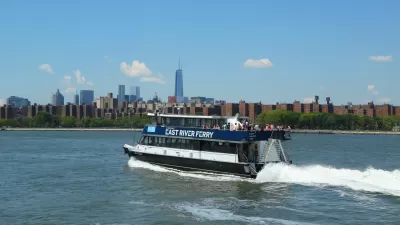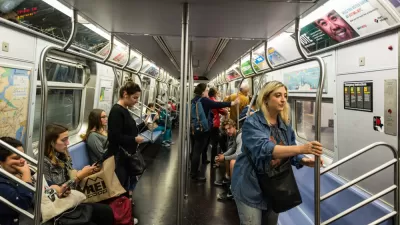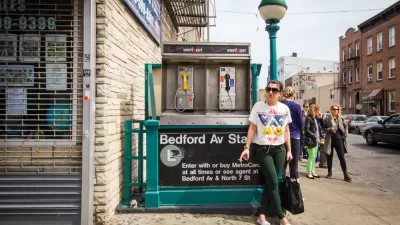Sam Roberts tells the story of commuting in New York City, starting from the very beginning, the maiden voyage of the first ferry from Brooklyn to Manhattan.
The article by Sam Roberts is a thorough and excellent examination of how significant moments in history can have large influence on the day-to-day lives of millions. A few highlights from the article, to provide an overview, with a lot more detail available in the full article:
- "This much is known about the maiden voyage of the Nassau: The twin-hulled boat carried 549 passengers, one wagon and three horses. It was captained by Peter Coffee, who would remain with the company that operated the vessel for 50 years."
- "What is unknown is the name of the first passenger — the man (and chances are it was a man) who on May 10, 1814, boarded the Nassau, the first regularly scheduled steam-powered ferry from Brooklyn to Manhattan. Whoever he was, he can justly be called America’s first commuter."
- "In 1814, when 'The Star-Spangled Banner' was written and the steam locomotive was introduced, Brooklyn was still a town. It was incorporated as a village, population 2,000, two years later, and officially became a city in 1834."
- "Today, two centuries after the first ferry left Brooklyn, New Yorkers have not stopped complaining. More than ever, though, they are commuting — and, lately, more and more by ferry."
FULL STORY: How a Ferry Ride Helped Make Brooklyn the Original Suburb

Alabama: Trump Terminates Settlements for Black Communities Harmed By Raw Sewage
Trump deemed the landmark civil rights agreement “illegal DEI and environmental justice policy.”

Study: Maui’s Plan to Convert Vacation Rentals to Long-Term Housing Could Cause Nearly $1 Billion Economic Loss
The plan would reduce visitor accommodation by 25% resulting in 1,900 jobs lost.

Why Should We Subsidize Public Transportation?
Many public transit agencies face financial stress due to rising costs, declining fare revenue, and declining subsidies. Transit advocates must provide a strong business case for increasing public transit funding.

Wind Energy on the Rise Despite Federal Policy Reversal
The Trump administration is revoking federal support for renewable energy, but demand for new projects continues unabated.

Passengers Flock to Caltrain After Electrification
The new electric trains are running faster and more reliably, leading to strong ridership growth on the Bay Area rail system.

Texas Churches Rally Behind ‘Yes in God’s Back Yard’ Legislation
Religious leaders want the state to reduce zoning regulations to streamline leasing church-owned land to housing developers.
Urban Design for Planners 1: Software Tools
This six-course series explores essential urban design concepts using open source software and equips planners with the tools they need to participate fully in the urban design process.
Planning for Universal Design
Learn the tools for implementing Universal Design in planning regulations.
Caltrans
Smith Gee Studio
Institute for Housing and Urban Development Studies (IHS)
City of Grandview
Harvard GSD Executive Education
Toledo-Lucas County Plan Commissions
Salt Lake City
NYU Wagner Graduate School of Public Service





























